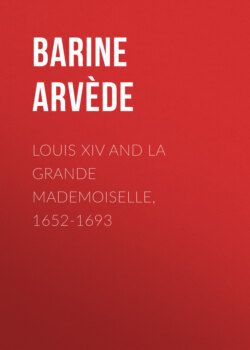Читать книгу Louis XIV and La Grande Mademoiselle, 1652-1693 - Barine Arvède - Страница 8
На сайте Литреса книга снята с продажи.
ОглавлениеJEAN DE LA FONTAINE From an engraving by Grevedon.
She learned at Saint-Cloud that she had been invited to rejoin the Court at Sedan. Mademoiselle took a route through Reims. She thus traversed Champagne, which had been a battle-field during the more than twenty years of the wars with Spain[33]; and which appeared the picture of desolation. The country was depopulated, numbers of villages burned, and the cities ruined by pillage and forced contributions of war.
More curious in regard to things which interest la canaille, Mademoiselle might have heard from the mouths of the survivors that of all the enemies who had trampled upon and oppressed this unfortunate people, the most cruel and barbarous had been her ally, the Prince de Condé, with whom were always found her own companies. She would not the less have written in her Mémoires, entirely unconsciously, apropos of her trouble in obtaining pardon from the Court: "I had really no difference with the Court, and I was criminal only because I was the daughter of his Royal Highness."
We have hardly the right to reproach her with this monstrous phrase. To betray one's country was a thing of too frequent occurrence to cause much embarrassment. The only men of this epoch who reached the point of considering the common people[34] and attaching the least importance to their sufferings were revolutionary spirits or disciples of St. Vincent de Paul.
Mademoiselle had no leaning towards extremes. Neither her birth nor the slightly superficial cast of her mind fostered free opinions. During her journey in Champagne, she was delighted to hear again the clink of arms and the sound of trumpets. Mazarin had sent a large escort. The skirmishers of the enemy swept the country even to the environs of Reims. A number of the people of the Court, seizing the occasion, joined themselves to her, in order to profit by her gens d'armes and light riders.
Colbert also placed himself under her protection with chariots loaded with money which he was taking to Sedan, and this important convoy was surrounded by the same "military pomp, as if it had guarded the person of the King."
The great precautions were, perhaps, on account of the chariots of money; the honours, however, were for Mademoiselle, and they much flattered her vanity. The commandant of the escort demanded the order from her. When she appeared the troops gave the military salute. A regiment which she met on her route solicited the honour of being presented to her. She examined it closely, as a warlike Princess who understood military affairs, and of whom the grand Condé had said one day, apropos of a movement of troops, that "Gustavus Adolphus could not have done better." A certain halt upon the grass in a meadow through which flowed a stream left an indelible impression. Mademoiselle offered dinner this day to all the escort and almost all the convoy. The sight of the meadow crowded with uniformed men and horses recalled to her the campaigns of her fine heroic times. "The trumpets sounded during dinner; this gave completely the air of a true army march." She arrived at Sedan intoxicated by the military spectacle of her route, and her entry showed this. Considering her late exile the lack of modesty might well be criticised. The Queen, Anne of Austria, driving for pleasure in the environs of Sedan, saw a chariot appear with horses at full gallop surrounded by a mass of cavalry: "I arrived in this field at full speed with gens d'armes and light riders, their trumpets sounding in a manner sufficiently triumphant."
The entire Court of France recognised the Grande Mademoiselle before actually seeing her. Exile had not changed her, and this entrance truly indicated her weaknesses.
